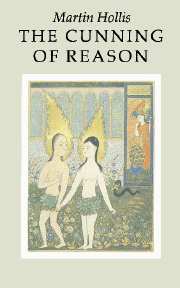Book contents
- Frontmatter
- Contents
- Preface
- 1 The sovereign artificer
- 2 Rational choice
- 3 Norms and institutions
- 4 The Cunning of Reason I: unintended consequences
- 5 Motivation
- 6 External and internal reasons
- 7 Rational Expectations
- 8 Maximising and satisficing
- 9 The Cunning of Reason II: functions and rules
- 10 Reasons and roles
- 11 Rationality and understanding
- 12 The Cunning of Reason III: self and society
- Bibliography
- Index
- Frontmatter
- Contents
- Preface
- 1 The sovereign artificer
- 2 Rational choice
- 3 Norms and institutions
- 4 The Cunning of Reason I: unintended consequences
- 5 Motivation
- 6 External and internal reasons
- 7 Rational Expectations
- 8 Maximising and satisficing
- 9 The Cunning of Reason II: functions and rules
- 10 Reasons and roles
- 11 Rationality and understanding
- 12 The Cunning of Reason III: self and society
- Bibliography
- Index
Summary
In the Bible story mankind is descended from Adam and Eve, after they had been beguiled by the serpent and expelled from the garden. When giving Adam the run of the place, the Lord God had expressly forbidden him to eat of the tree of the knowledge of good and evil: ‘for in the day that thou eatest thereof thou shalt surely die’. The serpent, being more subtil than any beast of the field which the Lord God had created, persuaded Eve otherwise. ‘Ye shall not surely die’, he insinuated; ‘your eyes shall be opened, and ye shall be as gods, knowing good and evil.’ What happened next is a puzzle. She saw that the tree was good for food (although so were plenty of others) and pleasant to the eyes (as if that mattered) and a tree to be desired to make one wise (how did she know what she was missing?). So she ate and gave to her husband, who ate also. They thus learnt that they were naked and made themselves aprons of fig leaves. Retribution soon followed.
This story has elements too difficult for the basic model of rational choice and I shall go at it obliquely by trying out a simpler one. Perhaps mankind is not descended from Adam and Eve. Dwelling outside Eden at the time was a group of homunculi, who may have created the first society and been our true ancestors. Their names were Solitary, Poor, Nasty, Brutish and Short, let us suppose out of respect for the famous bleak passage describing the state of nature in chapter xiii of Hobbes' Leviathan.
- Type
- Chapter
- Information
- The Cunning of Reason , pp. 59 - 73Publisher: Cambridge University PressPrint publication year: 1988



